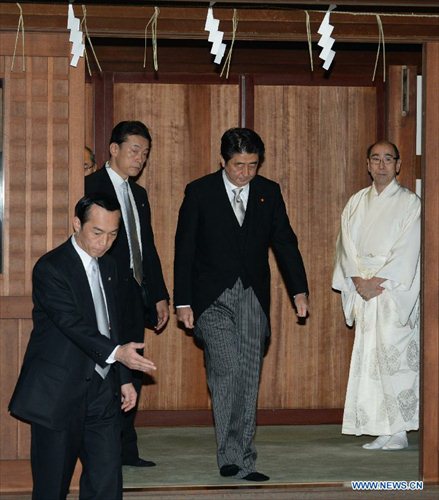HOME >> OP-ED
Blacklisting Abe an appropriate reaction
Source:Global Times Published: 2013-12-27 0:38:02

Japanese Prime Minister Shinzo Abe (2nd R) visits the war-linked Yasukuni shrine in Tokyo, Japan, on Dec. 26, 2013. Photo: Xinhua
Yesterday, Japanese Prime Minister Shinzo Abe visited Yasukuni Shrine, a symbol of the Japanese invasion during World War II. Such a brazen provocation has resulted in a backlash from China and South Korea. Even the US embassy to Japan said it was "disappointed" at such a visit.
China's reprimand is a necessary reaction to Abe's provocation, which can give a much deeper impression to the world community about how he committed such a blunder. But it has to be noted that China's diplomatic condemnation is what Abe's government would have anticipated. This approach has already lost its power to shock in Japan.
In Chinese society, people are getting tired of such futile "strong condemnations." They are expecting more feasible and effective approaches to counter Japan's aggression.
Considering Abe's bare provocation, China needs to take appropriate, even slightly excessive countermeasures, which will be understood by the international community. Japan must have realized the possibility, but it does not know exactly what the countermeasures will be.
If condemnations are China's only recourse, then the nation is giving up its international political rights easily. Ineffective countermeasures will make China be seen as a "paper tiger" in the eyes of the rest of the world.
China needs to step out of the box and come up with new countermeasures which are appropriately powerful. Putting Abe and his henchmen, such as some senior government officials and notorious Diet members who have visited the Shrine this year, onto a "most unwelcome" list should be well considered. China can shut its door to these people for a certain period, like five years.
By doing so, the Abe government will lose the slightest chance to repair the broken bilateral relationship. The countermeasure, which is directly and publicly aimed at the Abe government, can serve as a warning to the next generation of Japanese politicians: Whoever visits the Shrine in such a high-profile manner will be prohibited from visiting China. It could also become a reminder to Japanese people, who must think twice before they vote for another Abe-like prime minister at the cost of all high-level exchanges with China.
The blacklist will be highly appreciated at home. In the global sphere, our reaction will be sympathized with and understood because it is done to counter Abe's provocation and Japan's refusal to reflect on its sins in WWII.
Japan has long-held the initiative to challenge China over the Yasukuni issue. Blacklisting these shrine visitors will reverse China's disadvantageous position and transfer the initiative.
Keeping friendship between China and Japan should no longer be the bottom line when China evaluates its countermeasures against Japan's provocation. In the eyes of China, Abe, behaving like a political villain, is much like the terrorists and fascists on the commonly seen blacklists.
Related: China, S.Korea slam Abe’s shrine visit
Posted in: Editorial